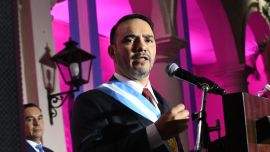The provincial leaders whom President Javier Milei will convene in Tucumán on the eve of Independence Day this week lead regions that are financially devastated. In the first six months of 2024, their share of federal revenue-sharing funds decreased by 12 percent in real terms compared to last year. Even worse, non-automatic (discretionary) cash transfers from the Casa Rosada to provincial capitals were slashed by a staggering 80 percent year-on-year.
These figures, detailed in a report by the Politikon consultancy firm, explain why most governors will attend the signing of the ‘Pacto de 25 de Mayo’ with pens in hand. Milei has imposed unsolicited fiscal austerity on them, forcing them to align themselves with the President to negotiate better terms via Interior Minister Guillermo Francos, whose job description includes engaging with the provinces.
So far, the three Ps – provinces, pensions, and public works – have been at the core of Milei’s fiscal adjustment, his main achievement in office. The credit goes to Economy Minister Luis ‘Toto’ Caputo, who was initially intended to be just a finance minister for Milei but has ended up overseeing a massive portfolio that encompasses every area of the economy, including direct control of the “independent” Central Bank.
Milei’s May Pact of July, which the provinces are expected to endorse, is a list of neo-conservative intentions. It includes broad commitments to reduce the size of government, consolidate fiscal surpluses, exploit natural resources and agree on a new federal revenue-sharing system. However, the accord does not provide any roadmap for achieving these commitments.
After the painful political process that led to the final approval of President Milei’s ‘Ley de Bases’ bill and Caputo’s accompanying fiscal package, the government has not outlined its full legislative agenda for the rest of the year. Economist Federico Sturzenegger, whom Milei announced a month ago would join the national administration, is rumoured to have drafted a bill called the “Leaf Litter Act” that is designed to eliminate red tape and regulations. Sturzenegger, a former governor of the Central Bank, was confirmed Friday as Milei's new Deregulation & State Transformation Ministry, though no details about the reported draft have yet been released.
Milei refers to the governors as ‘Liliputians,’ but he has realised that he cannot do without them and might now slow his international agenda (he has made nine foreign trips in just over six months) to fly a bit domestic. As he does, he will encounter governors managing their own affairs, some more successfully than others, given their circumstances.
For instance, Ricardo Quintela of La Rioja Province has introduced his own local currency to pay government wages, under the formal name of “Debt Cancellation Bonds” (BOCADE) but informally known as “Chachos,” after the nickname of the 19th-century provincial caudillo Ángel Vicente Peñaloza. La Rioja is one of the provinces that will not sign Milei’s May Pact, so expect more “Chachos” to be dished out.
Others, like Rolando Figueroa, are trying to capitalise on their resources. The governor of Neuquén Province crossed the Andes Mountains this week to sell Vaca Muerta gas to Chile. Gas consumption in Argentina’s neighbour is expected to grow by around 30 percent through 2030 before declining as the country progresses with its energy transition programme. This timeline is optimal for Vaca Muerta gas, which should start going global by the next decade if an LNG project led by Argentine state oil firm YPF advances and would need a solid market until then. “We don’t want to be Venezuela, a country unable to extract its resources,” Figueroa said while in Chile.
Up in the northwest, Salta Province Governor Gustavo Sáenz is already capitalising on the region’s resources. He recently inaugurated the first lithium carbonate plant in Salta, Argentina’s fourth, a joint venture by the French company Eramet and the Chinese company Tsingshan. “This is a milestone for us, consolidating the province as a prime destination for foreign investment,” said Sáenz, who quickly shifted from supporting Peronist candidate Sergio Massa last year to becoming a key supporter of Milei’s pro-foreign investment scheme, the RIGI.
These and other provincial governors are getting the message: that they are largely on their own now and need to adapt to the new jungle. A budget projection the government sent to Congress this week indicates that the cuts are here to stay – Milei might see their actions as signs that the provinces are embracing the libertarian message, but they are primarily trying to survive without the financial support they used to receive. They will welcome Milei if he decides to visit, hoping he might bring some (even if devalued) pesos with him.























Comments